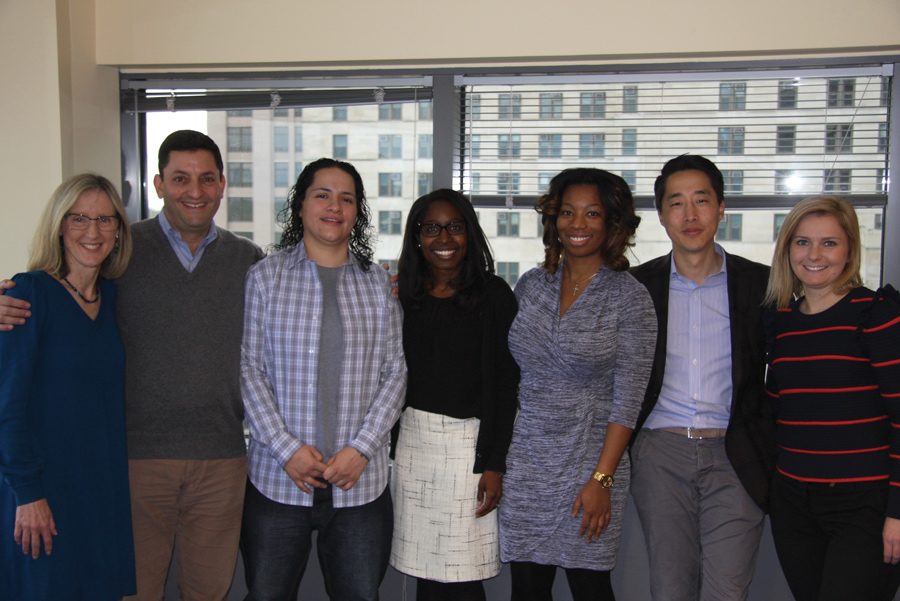Legal team responsible for Kerry Masterson’s acquittal examines flaws in eyewitness identification
Source: Center on Wrongful Convictions
Kerry Masterson (third from left) stands with her legal team from the Center on Wrongful Convictions and Neal, Gerber and Eisenberg. Masterson was acquitted Nov. 2 of a 2009 murder for which she had previously been found guilty.
November 10, 2017
After spending more than eight years in prison, Kerry Masterson was acquitted of 2009 murder charges when the Pritzker School of Law Center on Wrongful Convictions took on her case and reviewed weaknesses in eyewitness testimonies.
In a retrial that ended Nov. 2, a jury in the Circuit Court of Cook County found Masterson not guilty of the 2009 murder of Chicago convenience store owner Michael Norton. In 2011, a jury found Masterson guilty of first-degree murder and sentenced her to serve 58 years in prison.
Northwestern’s center, founded in 1999, identifies potential cases of wrongful conviction and advocates for criminal justice reform, according to its website. The legal team for Masterson’s retrial included representation from the center and Chicago-based law firm Neal, Gerber and Eisenberg.
School of Law Prof. Andrea Lewis, one of Masterson’s attorneys, said the center decided to represent Masterson after the Women’s Project, a group within the center, received a letter from her in 2014.
After reviewing the 2011 ruling, Lewis said the center took on Masterson’s case because of the “mistaken gender identification” made by witnesses.
“When we started doing our research and investigations into the case, we noticed that the rest of the evidence against Ms. Masterson wasn’t very strong,” Lewis said. “In addition, she had been denied the ability to use an eyewitness identification expert at her trial, and so we agreed to take the case on while her appeal was pending.”
Jonathan Quinn, a partner with Neal, Gerber and Eisenberg, said he joined Masterson’s team in 2016 and led it during her retrial. Quinn said Masterson deferred comment to her lawyers.
Masterson appealed the 2011 decision in September 2014 in an Illinois appellate court and was denied a retrial. With the center’s help, Masterson re-appealed in 2016, claiming her original 2011 trial erred in excluding expert testimony on eyewitness identification. She was granted a retrial in May of that year.
The May ruling followed a January 2016 decision by the Illinois Supreme Court in People v. Lerma, which noted –– from a scientific standpoint –– eyewitness testimony can be unreliable.
According to court documents from Masterson’s 2016 appeal, a man and woman who lived in the apartment above Norton’s convenience store were arrested for the crime and testified that Masterson was also involved. Eyewitnesses reported they saw a “skinny Hispanic male” fleeing the crime scene, but after Masterson was identified as a suspect, eyewitnesses were presented with female-only lineups, the documents said.
Collette Brown, an associate with Neal, Gerber and Eisenberg and a member of Masterson’s trial team, said eyewitness testimony can be “highly unreliable.” Brown said it was important for the retrial to have an expert on eyewitness testimony testify as part of Masterson’s defense.
“The science tells us that memory is not as reliable as people assume that it is. … Memory’s not like a video recorder,” Brown said. “The way you receive it, the way you recall your memory, other factors can influence it, and I think it’s really important that the jury, the judges (and) the prosecutors are informed of all the factors that can affect eyewitness identification.”
According to documents from Masterson’s retrial, prosecutors called three eyewitnesses to the stand who positively identified Masterson as the person they saw running away from Norton’s store in 2009.
Quinn said he hopes the outcome of Masterson’s case will result in future reforms.
“Even if judges of the Circuit Court of Cook County were now to routinely permit defendants to use expert witnesses, or routinely … give the jury additional information with which to vet and consider the testimony of eyewitnesses, all of those things would be very beneficial,” Quinn said.
Quinn added that the science of eyewitness testimony is a growing area of the law and more “scientific safeguards” are developing so that they address inaccurate and unreliable identifications.
Brown said the relationship between the center and Neal, Gerber and Eisenberg played a key role in the success of Masterson’s case. She added that Lewis was an integral part of the trial team.
“We truly just worked as one team and it was a great working experience,” Brown said. “We all brought something different to the team, we all worked together and pulled the load and it was all worth it.”
Email: elizabethbyrne2020@u.northwestern.edu
Twitter: @lizbyrne33



